Sector-specific Cash and Voucher Assistance
CVA can help people in crises address their needs within a specific humanitarian sector, such as water, food, health, shelter, livelihood, or protection. Sector-specific CVA can be restricted or unrestricted, and conditional or unconditional, and will typically be provided as part of a comprehensive package which may also include in-kind and service-based assistance.
Each sector has to consider different questions, challenges, advantages and risks when it comes to supporting people’s recovery within their area of expertise. This requires evidence, tools, guidance and capacity. Meeting sector-specific outcomes through CVA also requires a multi-sectoral understanding of needs and of household economic security – see Multipurpose Cash Assistance. While some sectors are very experienced in implementing CVA and have done so for many years, others are now catching up. Most humanitarian sectors are committed and have been increasing their efforts on sector-specific CVA. The Global Cluster Coordination Group (GCCG) is also coordinating cross-cluster work to improve the sectoral used of CVA.
Current priorities
The CALP Network works closely with the cash technical groups/task teams within the global clusters, who have been defining their 2020 priorities and workplans during their regular meetings. A general overview and specific details of these priorities across each global cluster is available here.
Sector-specific CVA subpages
Camp Coordination, Camp Management and Cash and Voucher Assistance
Page
Find out more about Camp Coordination and Camp Management (CCCM) in relation to Cash and Voucher Assistance (CVA). For the most up to date information visit the Global CCCM Cluster’s website.
Education and Cash and Voucher Assistance
Page
A brief introduction as to how Cash and Voucher Assistance (CVA) can support education outcomes. For the most up to date information please visit the Global Education Cluster’s website.
Food Security and Cash and Voucher Assistance
Page
A brief introduction as to how Cash and Voucher Assistance (CVA) can support food security outcomes. For the most up to date information please visit the Food Security Cluster Cash and Market Working Group web page.
Health and Cash and Voucher Assistance
Page
The content on this webpage has been developed with the Global Health Cluster.
Nutrition and Cash and Voucher Assistance
Page
Malnutrition continues to pose a major challenge to human well-being around the world. In 2020, an estimated 144 million children under five suffer from stunting (i.e. chronic malnutrition) , 47 million children under five were wasted (i.e. acute malnutrition) , of which 14.3 million were severely wasted, and an additional 340 million suffered from micronutrient deficiencies (UNICEF/WHO/WB...
Protection and Cash and Voucher Assistance
Page
How can Cash and Voucher Assistance (CVA) support protection outcomes? Please find a brief summary below, and for the very latest information, refer to the Global Protection Cluster Task Team on Cash for Protection.
Shelter and Cash and Voucher Assistance
Page
How can Cash and Voucher Assistance (CVA) support shelter outcomes? Please find a brief summary below, and for the very latest information, refer to the Shelter and Cash Working Group.
WASH and Cash and Voucher Assistance
Page
How can Cash and Voucher Assistance (CVA) support WASH outcomes? Please find a brief summary below, and for the very latest information, refer to the WASH Cluster’s Cash and Markets Technical Working Group.
Latest
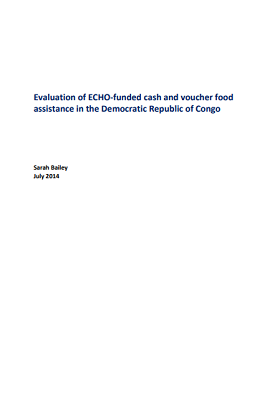
DRC Cash and Vouchers Food Security Evaluation (2014)
Report
People in eastern Democratic Republic of Congo (DRC) have long faced protracted conflict and instability resulting in the displacement of populations. In order to provide households affected by new displacements with timely access to food, ECHO funded the Norwegian Refugee Council (NRC), the Association...
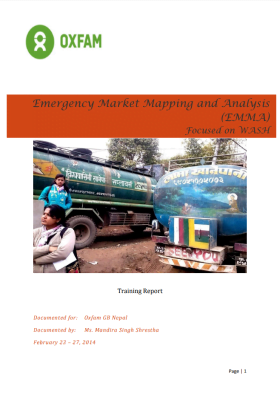
Training Report – Emergency Market Mapping and Analysis (EMMA): Focused on WASH
Report
Emergency Market Mapping Analysis (EMMA) is a toolkit guidance manual for humanitarian staff in sudden-onset emergencies which aims to improve emergency responses by encouraging and assisting relief agencies to better understand, support and make use of local market-systems in disaster zones. EMMA offers...
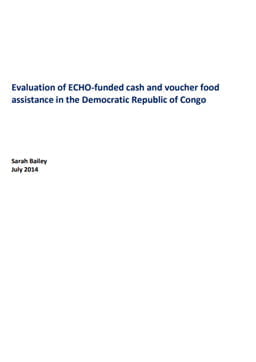
Evaluation of ECHO-Funded Cash and Voucher Food Assistance in the Democratic Republic of Congo
Report
People in eastern Democratic Republic of Congo (DRC) have long faced protracted conflict and instability resulting in the displacement of populations. In order to provide households affected by new displacements with timely access to food, ECHO funded the Norwegian Refugee Council (NRC), the Association...
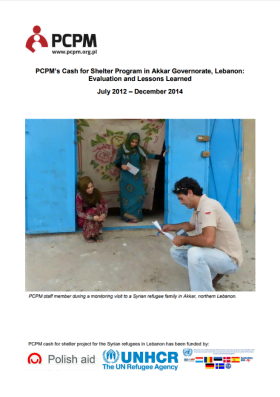
PCPM’s Cash for Shelter Program in Akkar Governorate, Lebanon: Evaluation and lessons learned
Report
The aim of this report is to provide an evaluation of the activities of Polish Centre for International Aid (PCPM) cash for shelter programme in the Akkar district in Lebanon. The evaluation has been focused on the long-term results of the humanitarian aid provided by PCPM to the Syrian refugees in Akkar...

Support to the local tool market post-Typhoon Haiyan
Report
Super Typhoon Haiyan struck Leyte and Eastern Samar in the Philippines in November 2013. CRS responded by initiating a program in 2014 to support the livelihoods recovery of 5,250 agriculture-based households. The Livelihood Early Recovery Support to Agricultural Households Affected by Typhoon Yolanda...
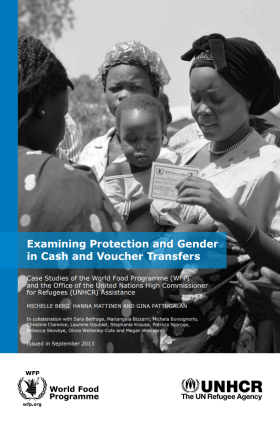
Examining Protection and Gender in Cash and Voucher Transfers
Case Study
With cash and voucher transfers increasing as a form of humanitarian assistance, the World Food Programme (WFP) and the UN Refugee Agency (UNHCR) teamed up to study the potential protection and gender impact of such transfers. While much research had been done about economic and market impacts of cash and...
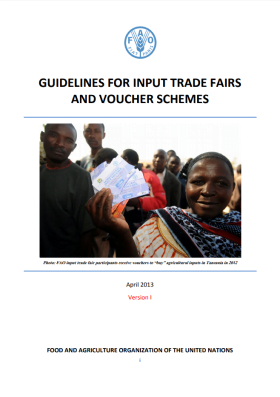
Guidelines for Input Trade Fairs and Voucher Schemes
Guidelines and Tools
One of the main causes of food insecurity for farmers in rural areas is limited access to agricultural inputs. The Food and Agriculture Organization of the United Nations (FAO) works to set up input trade fairs and voucher schemes to provide poor, vulnerable and food insecure farmers with access to the...
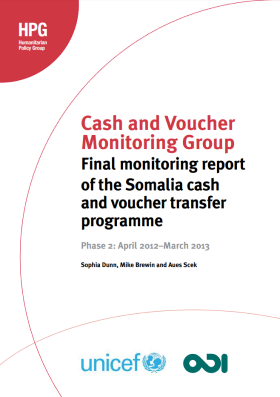
Final Monitoring Report of the Somalia Cash and Voucher Transfer Programme
Report
This report presents the findings of Phase 2 of a monitoring exercise of the Cash and Voucher Monitoring Group (CVMG), a unique partnership involving non-governmental organisations (NGOs) providing cash-based interventions in response to famine and humanitarian emergencies in South Central Somalia. It...
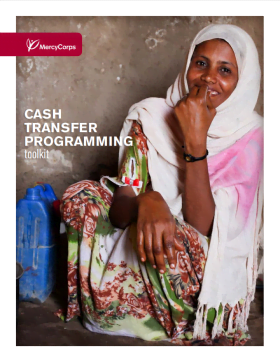
Cash Transfer Programming Toolkit
Guidelines and Tools
The Cash Transfer Programming (CTP) Toolkit is a basic guide to cash transfer programming in emergency response and early recovery settings. The publication is based upon best practiced and practical experience from Mercy Corps programmes. The Toolkit provides general guidance for CTP, as well as...
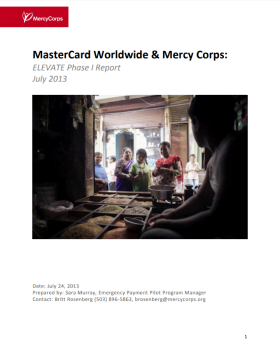
MasterCard Worldwide and Mercy Corps: ELEVATE phase I report
Report
The Nepal pilot focused on testing several key stages in the deployment of mobile vouchers, including the following: Identify a technology partner, Customize a mobile voucher platform, and Use the platform to distribute goods to people in need. Two different types of mobile vouchers (SMS and smartphone...
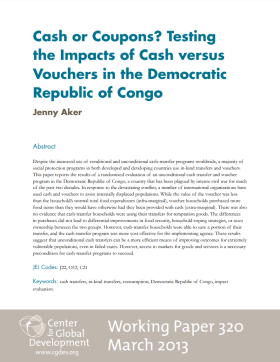
Cash or Coupons? Testing the impacts of cash transfers versus vouchers in the Democratic Republic of Congo
Report
Despite the increased use of conditional and unconditional cash-transfer programs worldwide, a majority of social protection programs in both developed and developing countries use in-kind transfers and vouchers. This paper reports the results of a randomized evaluation of an unconditional cash transfer...
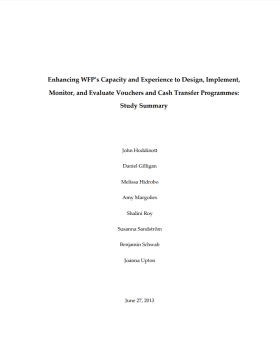
Enhancing WFP’s Capacity and Experience to Design, Implement, Monitor, and Evaluate Vouchers and Cash Transfer Programmes: Study summary
Report
With support from the Government of Spain, and in partnership with the World Food Programme (WFP), researchers from the International Food Policy Research Institute (IFPRI) evaluated four pilot projects to assess the comparative performance of cash transfers, food payments, and vouchers on household food...
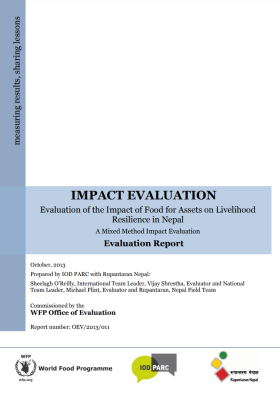
Impact Evaluation: Evaluation of the impact of food for assets on livelihood resilience in Nepal
Report
This evaluation, conducted by an independent team between January and July 2013, assessed the outcomes and impacts of the food-for-assets (FFA) components of two WFP programmes in Nepal: country programme (CP) 100930 (2002–2007) and protracted relief and recovery operation (PRRO) 106760 (2007–2010)....
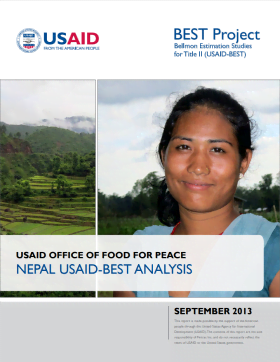
Nepal USAID-BEST Analysis
Report
During the months of July-August 2013, the Bellmon Estimation Studies for Title II (USAID-BEST) team undertook a study of the current state of agricultural markets in Nepal to inform USAID food assistance programming decisions. This USAID-BEST Analysis provides an overview of local markets,...
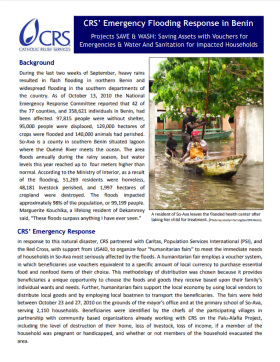
CRS’ Emergency Flooding Response in Benin
Report
In response to flash flooding in northern Benin and widespread flooding in the southern departments of the country, Catholic Relief Services (CRS) organised 4 “humanitarian fairs” to meet the immediate needs of households most seriously affected. These fairs were unique in that they incorporated three...

Water Trucking Market System in Harshin
Report
The Somali region of Ethiopia is an arid area which suffers from a water shortage every year. However, the degree of severity can differ quite markedly from year to year and the existence of microclimates within the region itself means that needs are never uniform. In 2011, the region experienced two...
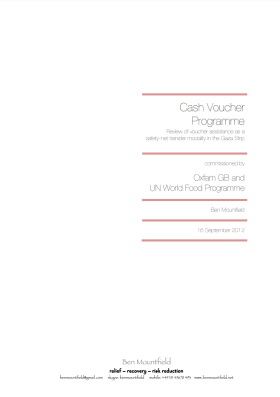
Cash Voucher Programme: Review of voucher assistance as a safety-net transfer modality in the Gaza Strip
Report
This review commissioned by Oxfam GB and WFP, looks at the effect of the Cash Voucher Project of WFP / Oxfam / Ma’an (CVP) on beneficiaries in Gaza. The review studies the impact on beneficiary diets and interviews beneficiaries to obtain their opinion on cash vouchers over in-kind food aid. The review...
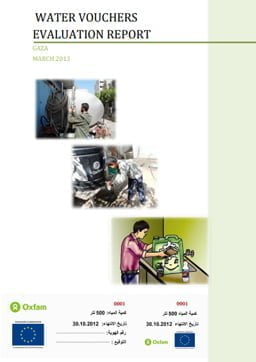
Water Vouchers Evaluation Report, Gaza 2013
Report
A participatory assessment on disaster risk reduction (DRR) was undertaken in GAZA governorate in 2011, OXFAM being the lead agency within the WASH cluster emergency response and preparedness in this area. Three vulnerable neighbourhoods (AL MALALHA, AL MOGRAGHA and AL ZARGA), were identified and an...
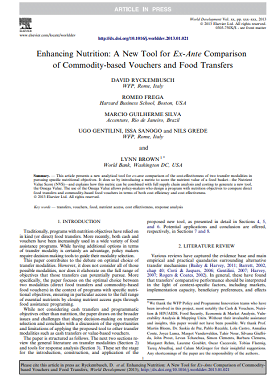
Enhancing Nutrition: A New Tool for Ex-Ante Comparison of Commodity-based Vouchers and Food Transfers
Report
Traditionally, programs with nutrition objectives have relied on in kind (or direct) food transfers. More recently, both cash and vouchers have been increasingly used in a wide variety of food assistance programs. While having additional options in terms of transfer modality is certainly an advantage,...

Logistics and Administration Guideline for Cash Based Interventions – Annexes
Guidelines and Tools
These annexes are designed to be used alongside the Logistics and Administration Guideline for Cash Based Interventions, which aims to support logisticians and administrators to successfully support cash based interventions (CBIs) and to help technical departments too. The annexes include: a the CALP...